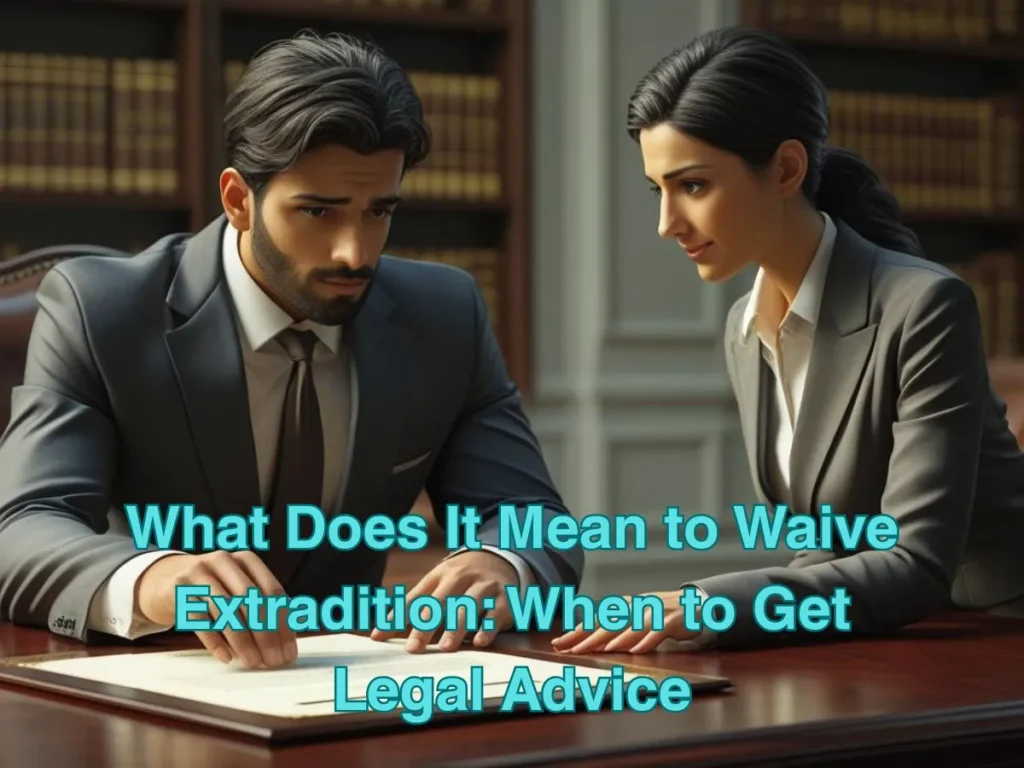Introduction
Being stunned by a legal situation from a different state of jurisprudence can leave you with a lot of questions along the lines of, “What does it mean to waive extradition?”
In many cases, the word most frequently mentioned when discussing such a frightening dilemma is “extradition waiver.”
Still, unfortunately, not everyone knows what it means, what it entails. And whether choosing it is the best decision given the person’s unique circumstances.
This guide aims to help individuals understand and navigate this often complex legal concept. We want to provide you with the information you need to make the right decision for this all-important choice.
What Does It Mean to Waive Extradition? The Core Definition

What does it mean when someone waives extradition? In other words, by “waiving extradition,” you are agreeing, voluntarily, to go back to the demanding state.
You do this without a formal hearing in the asylum state (the state of apprehension). Crucially, you decide this; it isn’t foisted on you by default.
Sign an Extradition Waiver. When you sign an extradition waiver, you forfeit your right to contest extradition in the courts of the asylum state.
This means you can no longer argue you are not the individual named in the warrant, or that the demanding state’s paperwork is incorrect.
This process facilitates the movement towards bringing you back to face the charges. It is very important to comprehend the “meaning of a waiver of extradition” because it affects your legal rights and the timeline of the case.
The next section, “waiver of extradition explained,” makes it apparent: it is a voluntary relinquishment of a certain legal right to contest your removal.
What Does It Mean to Waive Extradition: The Process
If you choose to waive extradition, this is how a normal process works. To truly grasp what does it mean to waive extradition, here are the steps involved.
- Arrest & Initial Appearance: You will be arrested first when you are arrested in a state other than the one where your warrant was issued. So, you appear in front of a judge for a typical initial appearance.
- Notification of Warrant & Rights: At this time, the judge will inform you on the record of the out-of-state warrant for your arrest. Importantly, they will also tell you about your right to an extradition hearing. This hearing provides an opportunity to contest the extradition if you decide to waive it.
- Opportunity to Waive: At this time, you will have the opportunity to “waive extradition. In other words, you can tell the judge you consent to returning to the demanding state voluntarily.
- Signing the Waiver: When you waive, you normally sign a written document.. This agreement is a written contract of your agreement. The judge will make sure your decision is voluntary and that you understand what you are doing by signing the extradition waiver.”
- Transfer to Demanding State: Once you sign and the court acknowledges it, authorities prepare to transport you to the demanding state. This process, however, is often brief, as you typically eliminate the legal obstacles to resisting extradition.
- During this “waiving extradition procedure,” the role of defense counsel is critical. We recommend you retain an attorney before signing anything or giving any verbal analysis or confession of ‘waiving extradition.
Pros & Cons: Should You Waive Extradition?
What does it mean to waive extradition is not a simple decision. It could go either way. Knowledge of these “waiving extradition consequences” is key when wondering, “should I waive extradition advice.
Here’s what to know:
Potential Advantages (Pros):
- Faster Transfer: For this purpose, people often use a waiver. If you do not contest extradition, you will typically transfer to the requesting state more quickly, resulting in less out-of-state jail time.
- Avoid Long Detention in an Asylum State: Fighting extradition can leave you sitting in an asylum state’s jail for weeks or even months as courts deal with your case. “Waiving extradition” generally translates into less time there.
- Show Cooperation: Sometimes, if you are willing to return on your own, prosecutors or state courts requesting your return to face justice may favor you.. This could mean opportunities for more favorable negotiations or plea deals.
- Earlier Resolution: Returning to the charging position allows you to start working on your legal case. This can expedite the resolution of all your charges.
Potential Disadvantages (Cons):
- Loss of Rights: The main downside is that once you have challenged the warrant and attacked your identity in the asylum state, you may no longer challenge the warrant or your identity in the asylum state’s courts. You missed an opportunity for your lawyer to identify weaknesses in the extradition paperwork.
- No Bail in Asylum State: Generally, if you waive extradition, you remain in the asylum state’s custody without bail pending transfer. It can mean unanticipated long periods of detention.
- Immediate Transfer: Acceleration is great and all, but it means less time to get oneself sorted out, personally. This could involve informing loved ones, organizing childcare or pet care, or managing personal and professional responsibilities.
- No Warrant Review: If you waive, the court of the asylum state will generally not be permitted to review the underlying charges or the merits of the warrant order. They verify your identity and that there’s a legitimate warrant.
In the end, whether to “resist extradition vs waiving” will likely be primarily based upon your specific circumstances and the advice of your lawyer.
What Does It Mean to Waive Extradition: Legal Rights & Considerations
Before you agree to “waiving extradition,” you need to know your rights and certain factors. This is a discussion directly on the issue of “legal rights when asked to waive extradition” and has accurate information.
First, you have right to an extradition hearing. This hearing allows you to contest your extradition on narrow grounds:
- Identity: Are you the same person the warrant is looking for?
- Warrant Validity: Is the warrant from the extraditing state legally good and correctly issued?
- Fugitive Status: Are you a fugitive from justice, or not, as the case may be?
- Second and most important, you have the right to an attorney. You should never waive extradition without first speaking to a qualified criminal defense lawyer. An attorney can help you by:
- Explaining the Charges: They will work to ensure you fully understand the charges you are facing in the strict state.
- Assessing the Warrant: They can scrutinize the warrant and any documents accompanying it for errors or legal issues.
- Advising on Consequences: They will clarify how the “waiving extradition consequences” will be for you, what it will mean for your bail bond situation.
- Exploring Options: They will discuss whether “resisting extradition” is a viable approach or if “waiving extradition” is a better option.
- Impact on Bail/Bond: They will explain how waiving or not waiving affects your chances of getting bail. Typically, if you waive, you will be detained without bond in the asylum state.
Additionally, keep an eye out for the Uniform Criminal Extradition Act (UCEA). Most states in the U.S. employ this act for interstate extradition.
It sets forth the process and your rights during extradition, including provisions for the “uniform criminal extradition act waiver.”
What Does It Mean to Waive Extradition: When to Get Legal Advice

Either way, what does it mean to waive extradition highlights that extradition law is complex, and the decision will effectively determine where and when a central figure in a criminal investigation will be prosecuted.
If you are the subject of an extradition demand, you need to talk to a good, experienced criminal defense lawyer before making any decisions or signing anything. You’re not able to deal with this by yourself. Here’s why you need a lawyer:
- Act Before Any Decision: Make the first- What to Do Before Any Decision -Once you have found out that there is an out-of-state warrant or an extradition request against you, get a lawyer. Your initial choice has significant, long-term legal consequences.
- Law’s Complexity: The law of extradition is a complex matter. It has particular practices that can differ from one state to another in far subtler ways. There are numerous nuances, and an attorney is well-versed in the specifics of the Uniform Criminal Extradition Act (UCEA), the corresponding federal laws (such as 18 U.S.C § 3182), and any applicable state laws.
- Personalized Advice: Each situation is different. An attorney can help examine your specific circumstances, the charges levied, and the laws of both the asylum state and the demanding state, as well as determine whether you have any available defenses. They can help you decide whether “resisting extradition” is a good idea or if “waiving extradition” is in your best interest.
- Negotiation Possibilities: In some cases, your lawyer can negotiate with the prosecutor in the state asking for your extradition. If you agree to waive extradition, they may be able to negotiate a better result or terms of surrender.
Do not jeopardize your freedom and future. The most important thing you can do is “call an attorney to waive extradition decision.
Conclusion
Know “What does it mean to waive extradition” when dealing with an out-of-state warrant. This indicates an ex parte consent to return without an initial hearing.
That is a decision that will affect your freedom and approach to the law, waiving certain rights. This guide contains crucial information, but it should not be used as a substitute for professional legal counsel.
If you or someone you care about faces an extradition petition, do not sign any papers in that case until you consult with an experienced criminal defense lawyer. Their expertise will guide and represent you well.
FAQs
With extradition waived, what’s next?
Waiving extradition is an act of voluntarily agreeing to return to the requesting state, rather than being compelled to do so through a formal legal process.
What is a waiver of extradition?
When you waive extradition, you are swiftly sent back to the demanding state to face the charges with no right to challenge the transfer.
What are the advantages of waiving extradition?
The primary advantage is the expedited return to the state from which the extradition is requested, and avoiding extended incarceration in the asylum state.
What rights do I lose if I waive extradition?
When you waive extradition, you forfeit your right to contest the warrant or the assertion of your identity in the asylum state’s court.
Is it a good idea to waive extradition without an attorney?
No, under no circumstances should you waive extradition without speaking to a seasoned criminal defense lawyer who can explain what all this means about your rights.








